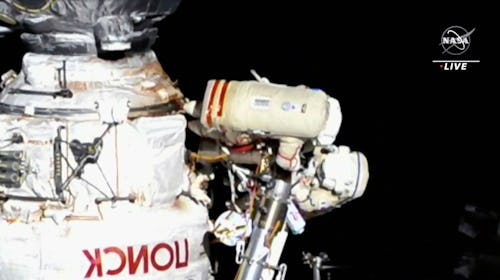Russia might leave the ISS. Here’s what that means for space.
With Russia threatening to ditch the International Space Station, changes will have to happen to keep it in orbit.

Since 1998, the International Space Station (ISS) has orbited the Earth and served as a point of global collaboration and research that is typically above — literally — terrestrial conflict. That appears to be ending. On Tuesday, the head of the Russian space agency Roscosmos, Yuri Borisov, announced the country would leave the ISS in 2024 to start its own orbital space station.
Word of Russia’s withdrawal comes as the country has been ostracized from the international community for its invasion of Ukraine. Russia has threatened to do this before though, both in April of this year and also prior to deciding to declare war on a sovereign nation.
At issue here is the United States’s ongoing sanctions on Russia, which have only squeezed the country harder since it has gone to war. Russia claims that the U.S. has impeded its ability to contribute to the international space project — something that NASA has denied. Given Russia’s past threats, it’s hard to know for sure if this one is legitimate or not, but it does cloud the possibility that the ISS will continue operating much past 2024, despite NASA’s stated plans to keep the station running through at least 2030.
Since launching in the late 1990s, the ISS has been a key component to our ongoing research into how space affects different life forms. The station has been home to more than 3,000 unique experiments. In the decades since it started orbiting the planet, it has been home to the growth of plants, the study of cold diffusion flames, and groundbreaking research into how space changes the human body over time.
Russia has played a key role in that, providing members of a rotating crew who operate the station and maintaining the propulsion control systems that keep the ISS in orbit rather than allowing gravity to pull it back toward Earth. Without Russia’s involvement, and without a backup plan in place, the ISS could be doomed to come crashing down to our planet below.
Luckily, there is a backup plan — albeit a far from perfect one. Earlier this year, the U.S. sent up an engine that could keep the station boosted should Russia decide to stop upholding its responsibilities. It’s possible Russia could use its ongoing control over the station’s thrusters to sabotage the ISS and keep its solar panels from facing the proper direction to get the energy it needs, though that would be a particularly dramatic step.
Basically, the U.S. has the tools right now to keep the ISS afloat without Russia for a little bit, assuming the country doesn’t actively decide to destroy the project. The ISS was only set to operate through 2030 as is, so Russia’s decision to pull out in 2024 might just mean calling it quits a bit earlier. Still, it’s a considerable bit of disruption in an operation that is at its best when conditions are predictable and research is collaborative. Unfortunately, Russia is too occupied with its actions on Earth to be a reliable contributor to our shared interests in space.